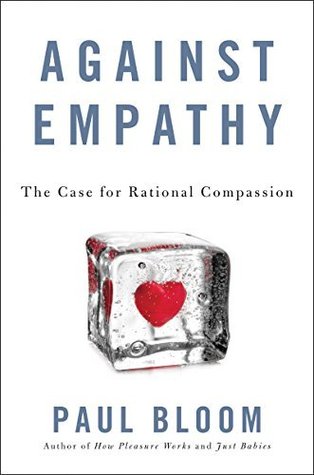More on this book
Community
Kindle Notes & Highlights
The authors of one study that looked at empathy, gender, and political orientation conclude that if males were as empathic as females, the gender gap in politics would almost entirely disappear.
More to the point, it is too crude to associate liberal policies with empathy. Consider that many policies associated with liberalism are also endorsed by libertarians, who are, by standard empathy measures, the least empathic individuals of all. Liberals and libertarians share common cause over issues such as gay marriage, the legalization of some drugs, and the militarization of the police. If such policies are grounded in empathy, it is mysterious why the least empathic people on earth would also endorse them.
“unmitigated communion,” defined as “an excessive concern with others and placing others’ needs before one’s own.”
You probably have never heard about unmitigated communion before, but the idea that you can feel too much of the suffering of others will be familiar. This is sometimes called “burnout,” a word that was coined in the 1970s. But it’s not a new insight; the idea has many origins, including, to my surprise, in Buddhist theology.
Buddhist scholar Thupten Jinpa:
As Cicero said about the merits of friendship—but he could just as well have been talking about close relationships in general—it “improves happiness and abates misery, by the doubling of our joy and the dividing of our grief.”
In On Apology, Aaron Lazare offers a similar sentiment: “what makes an apology work is the exchange of shame and power between the offender and the offended. By apologizing, you take the shame of your offense and redirect it to yourself.”
Then there is the wish to restore balance. Pamela Hieronymi puts it like this: “A past wrong against you, standing in your history without apology, atonement, retribution, punishment, restitution, condemnation, or anything else that might recognize it as a wrong, makes a claim. It says, in effect, that you can be treated in this way, and that such treatment is acceptable.”
In one study, Baumeister and his colleagues asked people to recall either an instance where they angered someone or one where they were angered by someone else. When people remembered incidents in which they were the perpetrator, they often described the harmful act as minor and done for good reasons. When they remembered incidents in which they were the victims, they were more likely to describe the action as significant, with long-lasting effects, and motivated by some combination of irrationality and sadism. Our own acts that upset others are innocent or forced; the acts that others do to
...more


